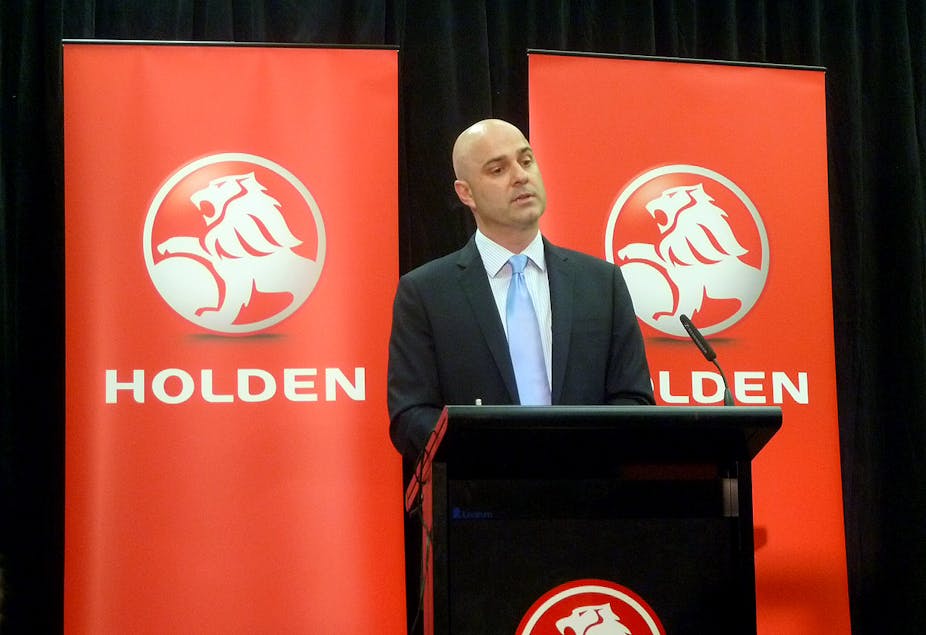GM Holden’s announcement that it will pull out of car manufacturing in Australia has led Toyota to question whether it can survive as a sole car maker in the country and prompted Labor and the union movement to blame the Abbott government for driving out Holden.
Holden will stop its Australian manufacturing in 2017 in a decision that will cost 2900 jobs over the next four years and hit many more thousands indirectly.
Toyota has publicly questioned whether it can continue as the sole vehicle manufacturer in Australia.
In a statement Toyota said the Holden decision “will place unprecedented pressure on the local supplier network and our ability to build cars in Australia.
"We will now work with our suppliers, key stakeholders and the government to determine our next steps and whether we can continue operating as the sole vehicle manufacturer in Australia.
"We will continue with our transformation journey as planned.”
General Motors’ announcement, which ends an era in Australian car manufacturing that began with the first Holden vehicles coming off the production line in 1948, followed strong pressure from the Abbott government to force the company to declare its hand.
In a statement from Detroit, GM chairman and CEO Dan Akerson said the decision “reflects the perfect storm of negative influences the automotive industry faces” in Australia.
These included “the sustained strength of the Australian dollar, high cost of production, small domestic market and arguably the most competitive and fragmented auto market in the world.”
The decision was revealed to the House of Representatives by acting opposition leader Tanya Plibersek, in question time. Acting Prime Minister Warren Truss, who had been informed by the company, said he had not referred to the announcement because the workers were being told at the time.
The direct job losses will be 1600 from the Elizabeth vehicle manufacturing plant and about 1300 from Holden’s Victorian workforce.
Truss told Parliament that while he regretted the decision, GM had “at least delivered certainty to the Australian market place and in particular certainty to their employees”.
“Holden has been an iconic national brand for Australians, a part of our heritage, which meant a great deal to Australians over several generations,” he said.
“We will do what we can with General Motors to achieve the very best possible outcomes for these people,” Mr Truss said.
“This is a difficult day for Australians, a difficult day particularly for the Holden employees, and we will stand with them to work constructively to make sure that they can transition into good jobs in other parts of our industry.”
GM Holden chairman and managing director Mike Devereux said the decision was not about anything other than the company’s business case. It was about “the current realities of our business”.
Devereux has been left embarrassed because yesterday morning he said in evidence to the Productivity Commission that no decision on Holden’s future in Australia had been made.
He said today that GM had made the decision a number of hours after his evidence.
“I received the final decision from General Motors yesterday afternoon,” he said.
He had had a call with GM leadership in the afternoon and that was when a decision was made to exit manufacturing. Pressed repeatedly on this timetable, he said “I always tell the truth”.
Devereux said the decision was irreversible; he would not speculate if things could have been different if the government had offered greater help.
“There is nothing that I can say to anybody to take the sting from this announcement,” he said. “This is an emotional day for people”.
Holden was not leaving Australia – it would become an importer of vehicles, he said. “It will be a very different presence.”
Labor and the Australian Manufacturing Workers Union blamed the government for Holden’s exit.
“Treasurer [Joe] Hockey dared Holden to leave Australia, and he got his way,” Plibersek said.
The AMWU’s National Secretary of the vehicle division Dave Smith said: “My view is that they’ve been betrayed by Tony Abbott and the Liberals … I lay this squarely on the feet of Tony Abbott.” He predicted that Toyota would now go.
AMWU National Secretary Paul Bastian said: “We’re looking at as many as 50,000 people who are directly employed in the car industry in Australia.This will punch a $21 billion dollar hole in the economy. Prime Minister Abbott has the redundancies of 50,000 workers and their families on his hands.”
Hockey accused Labor of hypocrisy and playing “pure politics”.
“We are going to everything we can for the workers,” not just at Holden but in the auto industry generally, Hockey said. He also urged Toyota workers not to reject a cost cutting workplace deal.
Industry Minister Ian Macfarlane, who had been the one minister who had sounded sympathetic to Holden’s claim for extra help said he was “deeply disappointed” by Holden’s decision.
“The government has been following a clear, methodical process via the Productivity Commission to provide a full assessment of all the factors impacting on car manufacturing in Australia, to fully inform the government on its response to support the industry,” Macfarlane said.
“I am disappointed that Holden hasn’t given the Australian government the time to complete that process.”
Devereux said he had had a number of productive discussions with Macfarlane.
Macfarlane said he had not expected the announcement from Holden. “I was floored” when Devereux rang him to let him know of the decision.
The Holden decision will feed into the South Australian and Victorian elections, both held next year.
Victoria Premier Denis Napthine told Parliament: “This is a very, very sad day for Australia and Victoria.”

